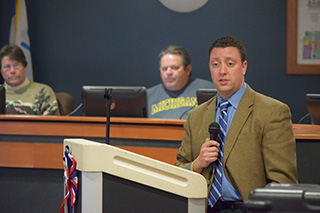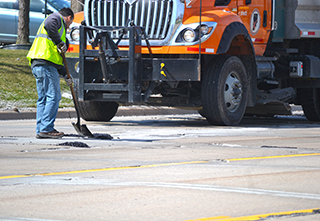
John LaMacchia discusses Proposal 1 at a recent Burton City Council town hall meeting.
The fate of Proposal 1 will be decided by voters next week (Tuesday, May 5), and there is one thing guaranteed about the outcome: If it passes it will provide a solution to fix Michigan’s crumbling infrastructure and will guarantee funding for transportation, local government, schools. And if it fails? No one can guarantee a solution out of the state Legislature.
That’s the simple message from the Michigan Municipal League’s John LaMacchia, legislative associate, in his many speaking engagements, media interviews and community meetings about Proposal 1 in recent days, weeks and months. LaMacchia has been the League’s voice on Proposal 1 after the League board unanimously endorsed the road funding package in January.
“The one thing that those for and against Proposal 1 agree on is the longer we take to come up with a transportation funding plan, the worse are roads are going to get,” LaMacchia said.
If Proposal 1 passes, it would guarantee, for the first time, that every penny we pay in state fuel taxes goes to transportation.
 Lansing would no longer be able to divert taxes paid on gas to some other state program or service.
Lansing would no longer be able to divert taxes paid on gas to some other state program or service.
Here is some additional information about what Proposal 1 would do:
Ballot Proposal:
- Raises the sales tax from 6% to 7%
- Exempts sales tax from motor fuel
- Removes higher education funding from the School Aid Fund
- Dedicates a portion of the use tax to K-12 education
Statutory Changes Effective Only if Proposal 1 Passes:
- Increases the tax charged on motor fuel
- Eliminates the depreciation on vehicle registration fees
- Increase registration fees on the heaviest trucks
- Requires more competitive bidding and road warranties
- Restores the Earned Income Tax Credit to 20% of the federal level
Revenue Generated:

We would fix more roads instead of just fill potholes if Proposal 1 passes May 5.
Fixing our roads will make them safer by repairing dangerous potholes and improving roadway design. Today, many drivers swerve to avoid dangerous potholes or lose control of their vehicles as a result of flat tires.
According to TRIP, a national transportation research organization, roadway design is a contributing factor in about one-third of fatal traffic crashes. Between 2008 and 2012, 4,620 people died in Michigan car accidents – an average of 924 fatalities per year.
For more information about Proposal 1 go to the League’s Safe Roads Yes! webpage.
To learn more about the Safe Road Yes! campaign go here. View here a series of question and answer videos about Proposal 1. Check out what MML members have to say about Proposal 1. See how much your community will get in additional road dollars and constitutional revenue sharing if Proposal 1 is approved. View which Michigan communities have passed resolutions in support of Proposal 1.
Matt Bach is director of media relations for the Michigan Municipal League. He can be reached at mbach@mml.org. The League’s John LaMacchia can be reached at jlamacchia@mml.org.




